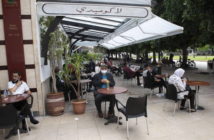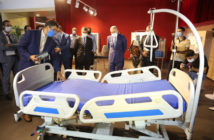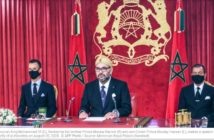AP
by Edith M. Lederer
U.N. Secretary-General Antonio Guterres urged religious leaders on Tuesday to challenge “inaccurate and harmful messages” that are fueling rising ethno-nationalism, stigma, hate speech and conflict as the coronavirus pandemic circles the globe.
The U.N. chief warned a video meeting on the role of faith leaders in addressing the challenges of COVID-19 that “extremists and radical groups are seeking to exploit eroding trust in leadership and feed on people’s vulnerability to serve their own ends.”
He called on faith leaders to promote solidarity based on human rights and human dignity as well as social cohesion, mutual respect and understanding.
Religious leaders can play “a pivotal role” in their communities and beyond “to deliver solutions to not only address the pandemic, but to recover better,” Guterres said, and they can encourage all communities “to promote non-violence and reject xenophobia, racism and all forms of intolerance.”
The meeting, organized by Morocco’s U.N. Ambassador Omar Hilale, was also addressed by Catholic, Jewish and Muslim religious leaders and other U.N. officials involved in promoting inter-religious harmony. Insight by CenturyLink: Federal technology experts navigate the road to network modernization in this exclusive executive briefing.
Citing an “alarming increase in violence against women and girls” as the pandemic spreads, Guterres appealed to religious leaders “to categorically condemn such acts and support shared principles of partnership, equality, respect and compassion.”
He also called on the leaders to fight against disinformation and misinformation about COVID-19 by using their networks and communications to promote World Health Organization recommended measures to prevent the spread of COVID-19 including physical distancing and good hygiene. And he urged them to ensure that worship, religious ceremonies and burial practices, “comply with these measures.”
Miguel Moratinos, high-representative for the United Nations Alliance of Civilization, noted that religious practices and rituals that have been curtailed during the pandemic are “triggering debates among faith communities around religious rights.”
“Passover, Easter and Ramadan, the three holy occasions which crisscrossed each other in April were marked differently this year in the context of social distancing,” he said.
Cardinal Miguel Ángel Ayuso Guixot, president of the Pontifical Council for Interreligious Dialogue, told the meeting that “with the whole of humanity stumbling, we must find ourselves united in facing the pandemic.”
“The way forward is to find the courage to open up the space for new forms of solidarity,” he said. Sign up for our newsletters for the latest news affecting the federal workforce.
He invited people of all faiths to join Pope Francis on May 14 in a day of spiritual unity, fasting, works of charity and prayers to end the coronavirus pandemic.
Rabbi Arthur Schneier, a Holocaust survivor and president of the Appeal of Conscience Foundation, called for a moment of silence to pray for the victims of COVID 19, the healing of the sick,and gratitude for all those on the front-lines.
Schneier said faith leaders “must be in the forefront of countering the hate mongerers in our midst who have invaded social media to disseminate xenophobia, anti-Semitism, bias against minorities and conspiracy theories, exploiting this tragic time for hatred and division.”
“As faith leaders we must fervently denounce and stem the scapegoating, the finger pointing and blaming others,” he said. “We must isolate the lepers of bias, heal the divisions and strengthen those forces committed to uniting a divided human family through mutual acceptance and respect and peaceful co-existence.“
“Unity and diversity, that’s what the world is all about,” said Schneier, the senior rabbi at New York’s Park East Synagogue.
Recalling the Marshall Plan that helped rebuild Europe after World War II, he urged all sectors of society to come together an establish “a 21st century recovery plan to repair and improve our wounded world.”
Ahmed Abaddi, secretary general of Morocco’s influential Islamic organization, the Mohammedan League of Scholars, said a great responsibility falls on the shoulders of religious leaders “to confront turmoil and challenges” including the COVID-19 pandemic and to promote the unity and fraternity shared by all religions.
Abbadi, an expert in counterterrorism, said “`the radicalists and of extremists” pretend to speak in the name of religion and then they announce needs, grievances, and arguments pointing to religious teachings.
“We need to face those claims and … to respond to the expectations of the masses, how to live religiously in the 21st century,” he said.







